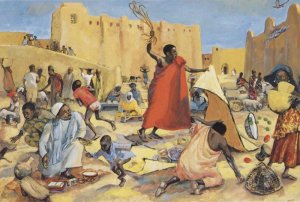By Rev. Gina Jacobs-Strain
 Imagine you just purchased a new car, perhaps your dream car; the keys were just handed to you. As the salesperson walks away, two people approach you, reach for the keys, and say, “The Lord needs it and will send it back here shortly.” The request is a little vague and, in the back of my mind as I write this, I hear 2 Peter 3:8, “With the Lord a day is like a thousand years, and a thousand years are like a day.” What would be your response to the request?
Imagine you just purchased a new car, perhaps your dream car; the keys were just handed to you. As the salesperson walks away, two people approach you, reach for the keys, and say, “The Lord needs it and will send it back here shortly.” The request is a little vague and, in the back of my mind as I write this, I hear 2 Peter 3:8, “With the Lord a day is like a thousand years, and a thousand years are like a day.” What would be your response to the request?
Similarly, the disciples, following Jesus’ instructions, take a new colt, never ridden, from a doorway. When asked about their actions, they say these very words to the bystanders. It is not clear in the text that the owner is present, but others in the community see the disciples approach and they release the colt, without resistance, for Jesus’ celebrated entrance into Jerusalem.
These few words raised so many questions for me. Did the “bystanders” recognize the two disciples and therefore knew they were connected to Jesus’ ministry? Did they recognize the term “Lord” as one that distinguished Jesus’ holiness and divinity? Did they know the Lord, Jesus Christ, having witnessed his miracles and having been blessed by his words? Had they surrendered their hearts unto “my beloved son with whom I am well pleased?” The disciples have my undivided attention with these words, “The Lord needs it.” My soul and heart are pierced with these words, no matter how many times I read or hear it.
Jesus, the consummate teacher, is showing us how to live in community. The statement conveys humility and invites the community of bystanders, the colt owner, and the disciples to participate in Christ’s ministry. Jesus also models inclusion and respect as Jesus promises through the disciples to return the colt shortly. Maybe the bystanders understood that all that we have belongs to God. Yet today, we often allocate our time, resources, and spiritual gifts that we have received from God back to serving God in a measured manner. It is funny that the things that God requires are often simple yet our willingness to be obedient make things complicated and not easily achieved.
As we approach Palm Sunday thinking about Jesus’ triumphant ride into Jerusalem, we should prepare our minds and hearts for Holy Week. Is God saying to you, “The Lord needs it?” Prayerfully, our sacrifices during the Lenten season, as well as our deepened spiritual practices, will renew and sustain us well beyond Lent because we have become more firmly planted in the holiness of our Savior. Let us persist and ask ourselves, “What does the Lord need from me so that I may participate more fully in sharing and doing the Gospel?” And so, I wonder with you, would I release the keys to my car (which has over 100, 000 miles and persistent issues) to someone who I knew was a devout Christian? Would I release it without resistance and a plan for its return? Where are the opportunities in my life for me to ask for help? Are we too busy, too smart, too “I-know-how-to-do-it” that we forget to invite others into the blessings of Jesus ministry? Let us ponder these words, asking God to show us new ways to witness God’s call to us and new ways to be in community. The Lord needs it.
 We introduce Rev. Gina Jacobs-Strain as the new executive director of American Baptist Women’s Ministries. Welcome, Gina!
We introduce Rev. Gina Jacobs-Strain as the new executive director of American Baptist Women’s Ministries. Welcome, Gina!





